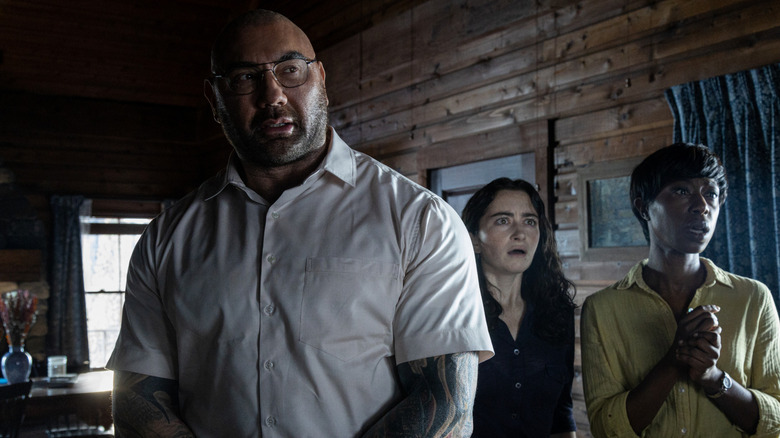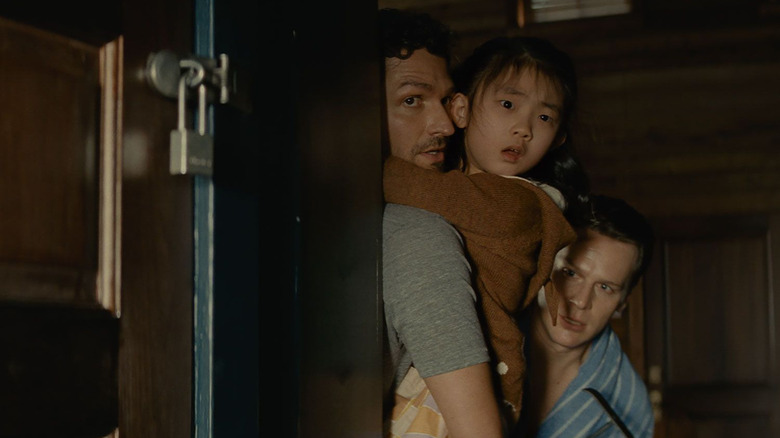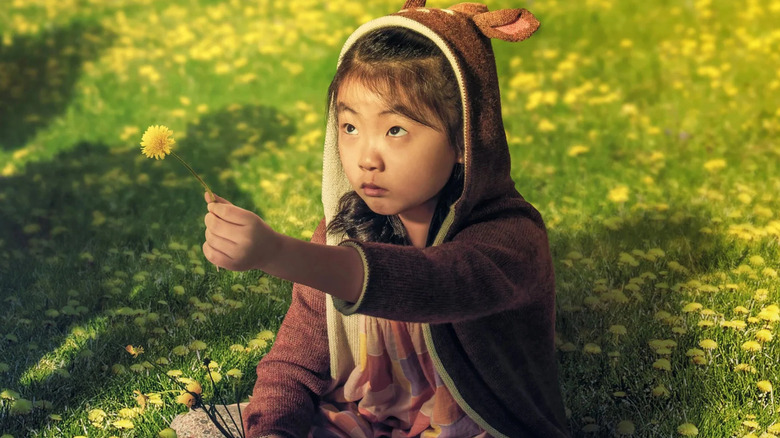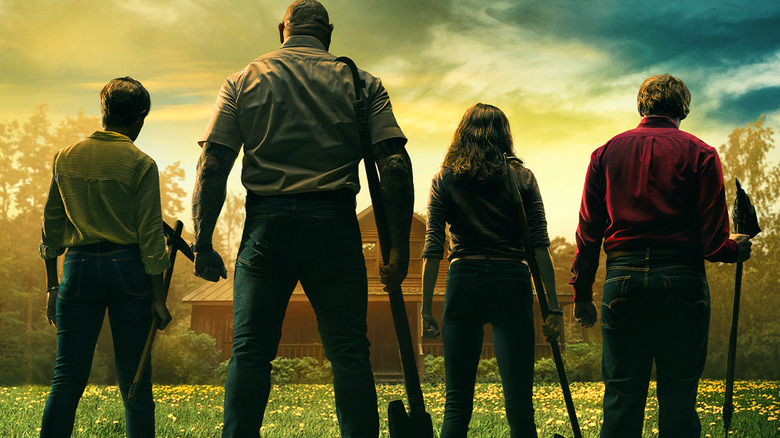M. Night Shyamalan Sees His Movies' Marketing As 'Part Of The Storytelling'
From the mind that brought us "the beach that makes you old" comes "the cabin of impossible decision-making!" M. Night Shyamalan is back with his latest thriller, "Knock At The Cabin," a home invasion horror film about the potential end of the world. Need I say more? Personally, I was on board the second I heard Shyamalan's name. In a way, the premise is inconsequential.
Knowing the tendencies of the writer-director behind titles like "The Sixth Sense," "Split," and "Old," however much we think we know, there will no doubt be plenty of surprises just waiting to spring: High-concept genre films with outlandish endings are his bread-and-butter. In fact, that's part of the reason that I closed my eyes when the latest trailer for "Knock At The Cabin" played ahead of my "M3GAN" screening this weekend — I'm already on board, no need to spoil my future fun with a trailer that shows too much!
I'm obviously not the only person who occasionally feels the need to shut my eyes during a trailer. Plenty of audience members worry about trailers giving way too much. So it only makes sense that the issue is also on the minds of the filmmakers working behind the scenes — and most certainly a director like Shyamalan, who clearly values the power of a surprise reveal. Per a new interview with TotalFilm, Shyamalan has essentially said that there's no reason to worry about that being a problem for "Knock At The Cabin," or any of his other movies for that matter. After many years in the business, he's learned a thing or two about making sure that the marketing works in tandem with his movie's storytelling.
Teaching the audience what to expect
Subverting expectations is the name of the game. Shyamalan explained to TotalFilm that he naturally gravitates to stories that take genres and "[bend] them in new ways." He enjoys knowing that the audience comes in "thinking they're watching something," only for it to change before their eyes. Naturally, trailers are a crucial part of that narrative. As most people's intro to the story, it becomes a place to hint at what's going on while hiding the truth of the matter. That doesn't mean deceiving us or giving away nothing at all, but being strategic about what the trailers do reveal:
"How much do we give away? That is always the conversation as I'm making something, and then when I'm talking to Universal, because they've released a lot of my movies recently. The conversation is: 'Hey, these are the things that are for the audience when they go to the movies, and these are the things that you can sell the movie on.'"
Not all directors get a say in how their movies are marketed, so it says a lot about Shyamalan's position and relationship with Universal that he gets to be involved in this process. He added:
"There are 'cards-up' high-concepts and 'cards-down' high-concepts that are in the movie. The 'cards-down' high-concepts are for the moviegoing experience. So we have those clear discussions, and even if the marketeers are going, 'Wow, if we took that cards-down thing, and just put it up...' I'll be like, 'No, no, no. That's not how we do it. You guys are part of the storytelling.'"
Expect the unexpected
According to the trailer and official synopsis, "Knock At The Cabin" sees parents Andrew (Jonathan Groff) and Eric (Ben Aldridge) taking their young daughter Wen (Kristen Cui) on vacation to a remote cabin — which is famously a very safe space for all fictional characters and most certainly not a classic horror movie setting marred by death. Needless to say, their hopes of achieving rest and relaxation are abruptly dashed by the appearance of four strangers (Dave Bautista, Nikki Amuka-Bird, Abby Quinn, and Rupert Grint) who tie up the parents and make a frightening request, in the name of saving the world. Why? Because of the apocalypse, silly!
As Shyamalan indicates, there's already a lot going on in that plot description, but it's probably just the tip of the iceberg. Much of the footage from the early trailers feels like it comes from the first half of the film — the family's arrival at the cabin and their initial confrontation with the strangers. So what else is going on? Since the story is based on Paul Tremblay's award-winning novel "The Cabin at the End of the World," fans have had plenty of time to speculate about the ending with the source material to help them. But try as they might, there's really no guessing how Shyamalan has transformed the story for his film.
Shyamalan likes to keep 'em guessing
In the same interview, he points out that Tremblay's novel and his adaptation are years apart, separated by seismic changes in the world.
"Paul Tremblay, wrote [the book] right around the time Trump was elected. He was feeling certain things about the world. It's really interesting that maybe he wrote it then, and I'm making a different version of the story here. It's a wonderful discussion that we're all going to have when you watch the movie. Is humanity worth saving? Are we good? The human experiment – is this working?"
So while Tremblay's book provided the foundation for the story, Shyamalan has taken its big themes into his own hands. There's obviously more to this story than the trailer wants us to believe, but we'll have to wait until the film arrives in theaters to get clear answers — and even then, I won't be surprised if we're all still scratching our heads as the credits roll.
The latest issue of TotalFilm, including the full interview with Shyamalan, hits newsstands on Thursday, January 12. "Knock At The Cabin" hits theaters next month, on February 3, 2023.



